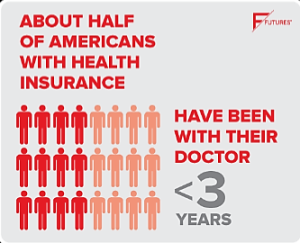 In a growing on-demand society, coupled with a burden of more out-of-pocket health care costs, U.S.health consumers tend to vote with their pocketbooks for healthcare based on cost and convenience, at least when it comes to prescription drug demand, according to the Finn Futures Health Poll conducted by Finn Partners.
In a growing on-demand society, coupled with a burden of more out-of-pocket health care costs, U.S.health consumers tend to vote with their pocketbooks for healthcare based on cost and convenience, at least when it comes to prescription drug demand, according to the Finn Futures Health Poll conducted by Finn Partners.
The survey was conducted in November 2015 among 1,000 U.S. online adults.
51% of consumers have been with their current health plans and primary care physicians for three years or less, which Finn Partners sees as a sign that brand loyalty isn’t a top motivation for health consumers signing on to either health insurance or doctors.
Brand loyalty also fades when it comes to prescription drugs: 43% of consumers say their pharmacist recommends alternative medications that differ from their doctor’s prescriptions, and half of these consumers accept their pharmacist’s advice and switch to the alternative Rx.
Another force is in play when it comes to medications, and that’s a third-party website — not the drug manufacturer’s branded product site, which only 8% of consumers visit if they have a question. Instead, most consumers visit a trusted third-party website with questions about their meds.
And celebrity endorsements? Don’t waste your money, pharma companies. Instead, bulk up your managed markets team to negotiate for favorable placement of drug formularies and lower co-payments for consumers.
Health Populi’s Hot Points: There’s no major surprise here for us at Health Populi, who have been tracking consumer self-rationing and health care substitution in the face of rising health care costs ever since co-payments for Tier 3 drugs began to reach $30. At that time, about 10 years ago, we were advising Pharma to watch out for the consumer-as-payer. Did these Pharma clients listen to us?
Not so much.
Today, it’s clear that the new consumer is the payer, and thus responsible for decisions that look and feel like retail ones they face when purchasing airline tickets or washing machines. While health consumers aren’t yet shopping the same way for health care services, products and professionals, they’re stretching new muscles to try to do so: seeking information on trusted third party websites (.gov’s, .org’s, and .edu’s, for example), working peer-to-peer with fellow patients in social networks, or tapping into health care concierge services offered by employers and health plan sponsors (such as Accolade, which focuses on employees working in self-insured companies).
In the meantime, it was revealed in the past week that that PhRMA, the lobbying advocacy group for the Pharma industry, was funding a campaign to improve the sector’s reputation. But to the consumer, it’s still the personal health economics, pharma (and PhRMA). The Finn Partners data confirm what we’ve been saying and sure of for a very long time.





 Interviewed live on BNN Bloomberg (Canada) on the market for GLP-1 drugs for weight loss and their impact on both the health care system and consumer goods and services -- notably, food, nutrition, retail health, gyms, and other sectors.
Interviewed live on BNN Bloomberg (Canada) on the market for GLP-1 drugs for weight loss and their impact on both the health care system and consumer goods and services -- notably, food, nutrition, retail health, gyms, and other sectors. Thank you, Feedspot, for
Thank you, Feedspot, for  As you may know, I have been splitting work- and living-time between the U.S. and the E.U., most recently living in and working from Brussels. In the month of September 2024, I'll be splitting time between London and other parts of the U.K., and Italy where I'll be working with clients on consumer health, self-care and home care focused on food-as-medicine, digital health, business and scenario planning for the future...
As you may know, I have been splitting work- and living-time between the U.S. and the E.U., most recently living in and working from Brussels. In the month of September 2024, I'll be splitting time between London and other parts of the U.K., and Italy where I'll be working with clients on consumer health, self-care and home care focused on food-as-medicine, digital health, business and scenario planning for the future...